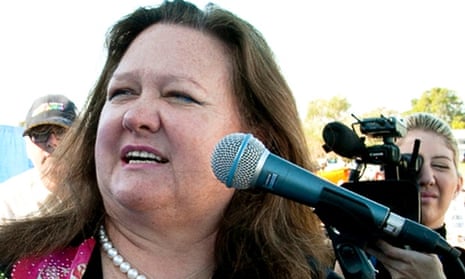Australia’s system of environmental protections has been labelled “broken” after it emerged that Gina Rinehart’s mining company was able to negotiate down a compensation payment demanded by the government.
Documents obtained under freedom of information show that the previous Labor government demanded $800,000 a year in “biodiversity offsets” from GVK Hancock due to the environmental impact of its proposed coal terminal in Queensland.
But the documents state GVK Hancock considered this amount “excessive” and put in a counter-offer of $375,000 a year.
The government acquiesced to this bargaining, with a figure of $600,000 a year eventually deemed an “adequate” amount.
This change meant that $50,000 a year, rather than $100,000 a year, would be given to the Great Barrier Reef marine park authority to help manage the reef’s world heritage area. The rest of the money was given to fund Indigenous rangers and conservation projects.
GVK Hancock, which will be spending around $10bn on the coal project, requested that the offsets strategy be delayed until after the project began.
The company also wanted to change a stipulation that coal dust should not enter the Great Barrier Reef environment. The government agreed to both of these requests.
GVK Hancock was given approval in October 2012 for the coal terminal at Abbot Point, which sits adjacent to the Great Barrier Reef near the Queensland town of Bowen.
The company, a joint venture between Rinehart’s Hancock Prospecting and Indian resources firm GVK, plans to export 60m tonnes of coal a year through the Abbot Point terminal from 2017.
The coal will be taken to the port via a 500km rail line that connects to two large GVK Hancock mines in central Queensland – the Alpha and Kevin’s Corner projects. The Alpha project, which plans to remove 32m tonnes of coal a year, has been challenged in court by environmentalists and farmers, who are concerned over its impact on groundwater.
The Abbot Point terminal will involve the clearing of 28ha of wetlands and the controversial dredging and dumping of 5m tonnes of seabed within the Great Barrier Reef marine park. The previous government set a number of conditions on the development, to offset the impact on seagrasses, which are vital to the survival of dolphins, turtles and dugongs.
Adam Walters, a campaigner at Greenpeace, said the negotiation over offset payments showed “the system is broken”. “These indirect financial offsets allow the government minister to claim some sort of victory when approving these projects but it’s not an honest system, it’s not based on solid science,” he said.
“The offsets package is meant to be a measure of last resort if it’s not possible to avoid damage. The quantum of that should be determined by the environmental impact, you shouldn’t be able to haggle the amount down.”
Bruce Lindsay, project officer for Environmental Justice Australia, said offsets were inherently flawed.
“Financial offsets aren’t good practice, as they are about giving a lump of cash for ecosystems that can’t be compensated for,” he said. “The first impulse of developers is to buy their way out of things and offsets allow them to do this. The tail is increasingly wagging the dog.
“The government should have a strong negotiating position and use it for the best environmental outcomes, but it seems they just capitulate.”
In June, a Senate committee published a report into environmental offsets, which is where land is set aside by mining, oil and gas companies to compensate for habitat destroyed during development. Sometimes these offsets are financial, such as the funding of conservation work for species impacted by mining.
The committee recommended that offsets be “used only as a last resort” and called for stricter rules around the use of offsets in “red flag” areas such as world heritage and critically endangered ecosystems.
A spokeswoman for the Department of the Environment said developers could comment on any conditions as a matter of “natural justice”.
“Consistent with these legal requirements, Hancock was provided with the opportunity to comment on the proposed decision, conditions, and financial contribution before a final decision,” she said. “The then environment minister [Tony Burke] made the final approval decision.
“Offsets provide environmental benefits to counterbalance the impacts that remain after avoidance and mitigation measures are undertaken.
“The overarching test of both the policy and the guide is that suitable offsets must deliver an overall conservation outcome that improves or maintains the viability of the aspect of the environment that is protected by national environment law and affected by the proposed action.”
A spokesman for GVK Hancock said: “It’s important to not just look at one aspect of our approval conditions at Abbot Point, as we will contribute in excess of $25 million on a range of contributions and environmental management programs in the Abbot Point area, despite the proposed dredging having no significant residual impact to commonwealth matters of national environmental significance.”







